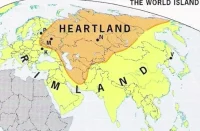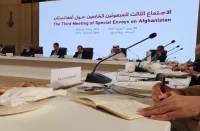Despite the fact that the U.S. has officially announced the withdrawal of troops from Afghanistan in 2014, things are coming so that they will remain there. The question, in what status, with what rights and, more importantly, with what goal – increasingly concerns the neighbors of Afghanistan: Russia, China, and Central Asia.
An agreement on strategic cooperation between Washington and Kabul is on the way, which, as U.S. Secretary of State Hillary Clinton said after talks with Foreign Minister of Afghanistan, will be signed shortly before or on the sidelines of the NATO summit in May in Chicago.
On the one hand it is to ensure more or less worthy withdrawal of the U.S. from the longest war in the history of this country. And for Obama it is especially important on the eve of presidential elections in the U.S. Although it was not he that started this war, but the Republicans, however the nation has lost 2,000 soldiers in Afghanistan, $500 billion and the account is not yet closed.
The task to keep the front going is not easy though. The issue is not about the victory, and simultaneously with the preparation of an agreement with Kabul, the U.S. entered into formal negotiations with those whom they had accused of supporting al-Qaeda and against whom they started the war in October 2001 – Afghan Taliban. Despite 11 years of occupation, their influence outside of Kabul is large enough and is continually fed by incidents like the burning of the Koran at the U.S. base and the recent shooting of 17 civilians in Kandahar.
Afghan president Hamid Karzai’s power can collapse already the next day after the departure of the Americans. Therefore, a strategic cooperation agreement between the U.S. and Afghanistan obviously would also provide for the preservation of American military facilities there.
“Karzai too stands for the bases preservation; he seeks to keep the situation under control and maintain power after 2014, and the Loya Jirga (Afghan grand assembly of national and tribal representatives). The Americans themselves want this to retain influence in Central Asia and the Caspian Sea, where the largest reserves of oil and gas are concentrated. Beyond that, the bases in Afghanistan allow to control China, Russia, and Iran. To put it otherwise, there are economic and geo-strategic reasons, and the U.S. will not give Karzai regime to the Taliban for no particular reason,” said Victor Korgun, Head of the Afghanistan Department at the Institute of Oriental Studies of the Russian Academy of Sciences.
The deal on bases seems to be settled and it begins to bother Russia. In this connection Moscow offers to maintain the United Nations control over the foreign troops in Afghanistan after the withdrawal of NATO troops in 2014. Russian Foreign Minister Sergey Lavrov touched on this topic at least twice recently.
“If the military presence in the country must be preserved, then you should continue to fulfill the mandate of the Security Council. It is illogical when someone does not want to fulfill the mandate, believing that he has already done it, but at the same time intends to deploy and maintain military bases. And then, I believe that the territory of Afghanistan should not be used to create some or other military facilities that would cause third countries’ concern,” he said in an interview with the Afghan channel, Tolo TV. In compacto Moscow’s position is that if the U.S. maintains a military presence in Afghanistan, then it must receive a mandate to this from the UN as a Security Council resolution, which, by the way, at the same time has to assess what had been done in Afghanistan for the 11 years war.
“The presence of NATO constrains terrorism in the region, and Russia is interested that the U.S. and NATO Afghanistan ahead of time leave,” said Korgun in this regard. “Police functions should be performed, the more especially as there is the UN mandate to do this. But we are not interested that NATO would remain in the region as a military force.” The Chinese are not either.
At the NATO summit in Chicago, which will be devoted to Afghanistan, the format and scope of U.S. and NATO troops future military presence there will be probably cleared up completely. However, it seems their status will not satisfy the neighbors.
“We are interested that Afghanistan would be a neutral country…” said Lavrov. In fact, NATO will be one step closer to Russia’s borders. A reason for new clashes.
Source: Russia Beyond the Headlines
RELATED ARTICLE:
US in Afghanistan: Leaving to Stay














Comments